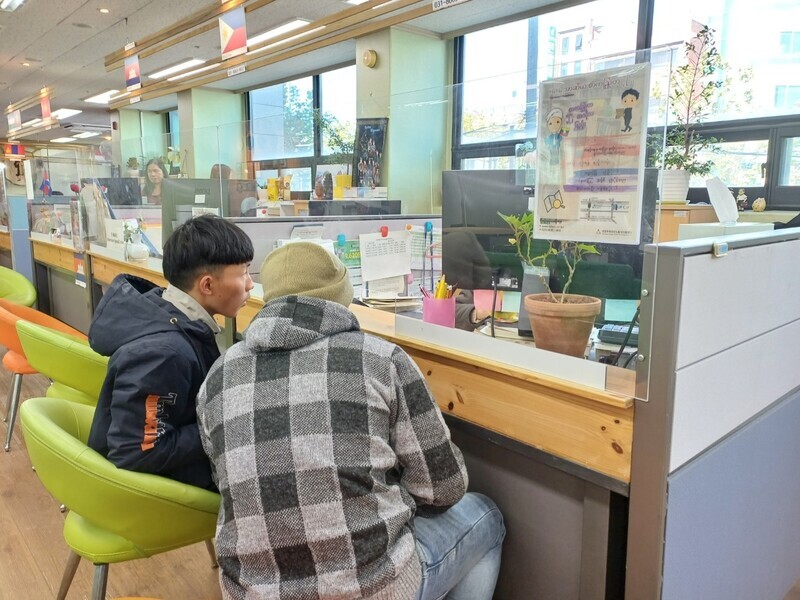hankyoreh
Links to other country sites 다른 나라 사이트 링크
[Editorial] Korea wants more migrant workers, but without providing protections for them

The South Korean government has decided to dramatically increase the number of foreigners permitted to enter the country to work in non-professional fields next year through the employment permit system — but the apparent absence of corresponding protection measures is raising concerns.
As more and more foreign nationals perform the kinds of jobs that South Koreans avoid, this raises ongoing issues with wage nonpayment, human rights infringements, and unregistered sojourns by workers leaving their workplaces.
The plan finalized by the government on Monday allows for 165,000 foreigners to come to the country and work on E-9 visas next year through the employment permit system. As recently as 2021, that number was at 52,000. It was raised to 69,000 last year and 120,000 this year, and now another large increase is on the horizon for next year.
Under the employment permit system, companies that are struggling to fill jobs receive government permission to hire foreign workers.
As the amount of workers arriving through the system increases rapidly, the types of jobs for which permissions are granted have been expanding from smaller manufacturing and construction company work into the service industry. As of next year, jobs in restaurants, mining and forestry are to be added.
The problem is that as the government neglects efforts to improve the quality of jobs where workers suffer poor treatment and focuses instead on bringing in foreign workers to fill the gap, the side effects have been piling up.
The balance of unpaid wages for foreign workers exceeded 120 billion won (US$93 million) last year, with foreign nationals representing 12% of all victims of wage nonpayment.
Also, smaller-scale workplaces tend to present a greater risk of housing issues and human rights infringements resulting from linguistic and cultural differences.
Next year, the employment permit system is being opened to restaurants with fewer than five employees, which are not subject to protections under the Labor Standards Act. The government says it is imposing requirements on business owners, including preventions on long working hours and guarantees on the right to rest. But the past record raises questions as to whether it is capable of really managing and overseeing things.
The government has also decided to eliminate next year’s budget for South Korea’s 40 or so foreign worker support centers. These institutions have been offering support to foreign workers with services including grievance counseling, conflict mediation, Korean language education, and information for daily living.
The government has been at a loss dealing with the issue of undocumented workers, which has continued to grow even with large-scale policing. The Ministry of Justice had declared plans for rigorous crackdowns designed to reduce the number of illegal sojourners from over 400,000 to under 300,000 over a five-year period, but the results have been meager.
Since foreign workers are not free to change their workplace of their own accord, those who are faced with difficult working environments often find themselves driven to leave those workplaces and stay in the country without proper documentation. Quite a few employers in industry areas show a preference for these undocumented workers, who are outside the reach of labor laws.
Isn’t it the government’s role to examine these structural issues closely and develop measures to address them?
Please direct questions or comments to [english@hani.co.kr]

Editorial・opinion
![[Column] The miscalculations that started the Korean War mustn’t be repeated [Column] The miscalculations that started the Korean War mustn’t be repeated](https://flexible.img.hani.co.kr/flexible/normal/500/300/imgdb/original/2024/0630/9717197068967684.jpg) [Column] The miscalculations that started the Korean War mustn’t be repeated
[Column] The miscalculations that started the Korean War mustn’t be repeated![[Correspondent’s column] China-Europe relations tested once more by EV war [Correspondent’s column] China-Europe relations tested once more by EV war](https://flexible.img.hani.co.kr/flexible/normal/500/300/imgdb/original/2024/0628/7617195640940814.jpg) [Correspondent’s column] China-Europe relations tested once more by EV war
[Correspondent’s column] China-Europe relations tested once more by EV war- [Correspondent’s column] Who really created the new ‘axis of evil’?
- [Editorial] Exploiting foreign domestic workers won’t solve Korea’s birth rate problem
- [Column] Kim and Putin’s new world order
- [Editorial] Workplace hazards can be prevented — why weren’t they this time?
- [Editorial] Seoul failed to use diplomacy with Moscow — now it’s resorting to threats
- [Column] Balloons, drones, wiretapping… Yongsan’s got it all!
- [Editorial] It’s time for us all to rethink our approach to North Korea
- [Column] Why empty gestures matter more than ever
Most viewed articles
- 1[Column] The miscalculations that started the Korean War mustn’t be repeated
- 2Yoon echoed conspiracy theories about Itaewon disaster, former National Assembly speaker says
- 3Dreams of a better life brought them to Korea — then a tragic fire tore them apart
- 4Blaze at lithium battery plant in Korea leaves over 20 dead
- 5[Correspondent’s column] Who really created the new ‘axis of evil’?
- 6[Correspondent’s column] China-Europe relations tested once more by EV war
- 7[Editorial] Seoul failed to use diplomacy with Moscow — now it’s resorting to threats
- 8[Editorial] Exploiting foreign domestic workers won’t solve Korea’s birth rate problem
- 9CIA record confirms US ‘completely destroyed’ Seoul’s Haebangchon in 1950 bombardment
- 10Moscow tells Seoul to rethink ‘confrontational course’